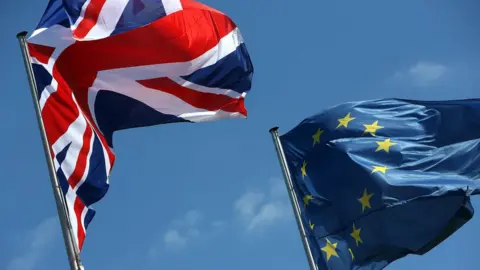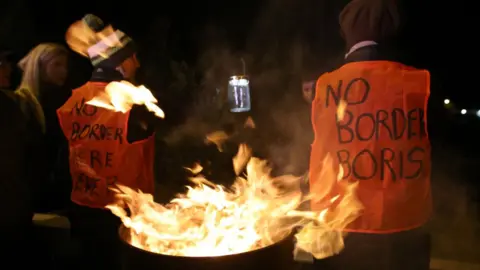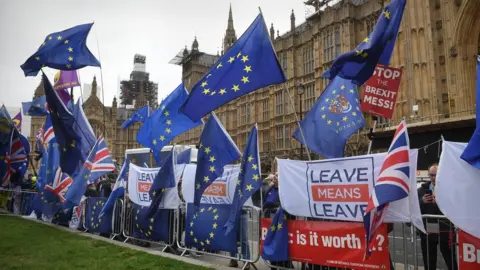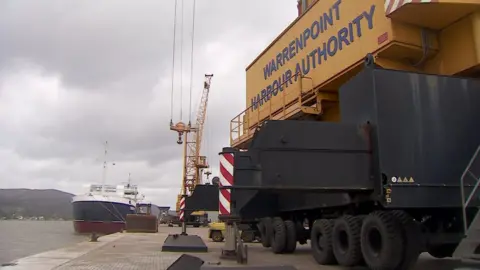Brexit: New year, new deal and what it means for NI
 Adam Berry/getty images
Adam Berry/getty imagesMPs return to Parliament next week and will move quickly to turn the prime minister's Brexit deal into a law which will take the UK out of the EU on 31 January.
But what will that mean for Northern Ireland?
What happens after 31 January?
The UK will have legally left the EU, but will immediately begin a transition period.
All parts of the UK will continue to follow EU rules and contribute to the EU budget.
The trading relationship between the EU and UK will be unchanged during this period.
 PAUL FAITH/getty images
PAUL FAITH/getty imagesNorthern Ireland's trading relationship with the rest of the UK will also stay as it is now during the transition.
The transition is due to end on 31 December 2020 and the prime minister says it will not be extended.
Its purpose is to give a breathing space for a new phase of negotiations which will determine the long-term relationship between the UK and the EU.
Much of the focus has been on what sort of trade deal the two sides could achieve, but they will also have to negotiate the details of their broad agreement on Northern Ireland.
What has been agreed on Northern Ireland?
After Brexit, Northern Ireland will be outside the EU while the Republic of Ireland will remain inside.
But the UK and EU agreed this should not lead to new checks or controls on goods crossing the border between the two parts of Ireland.
To achieve this Northern Ireland will continue to follow EU rules on agricultural and manufactured goods, while the rest of the UK will not.
Additionally, the whole of the UK will leave the EU's customs union but Northern Ireland will continue to enforce the EU's customs code at its ports.
This will all mean some new checks and processes for goods moving between Northern Ireland and other parts of the UK.

The UK and EU now have to negotiate the nature and extent of those checks.
During the election campaign the prime minister insisted that for goods moving from NI to GB, there would be "no forms, no checks, no barriers of any kind".
The EU is equally clear that the deal means NI to GB goods trade will face a new administrative process known as an exit declaration.
Clearly this is going to have to be negotiated.
Who will be doing the negotiating?
The operation of the whole withdrawal deal will be overseen by a Joint Committee of the EU and UK.
It will be led on the EU side by a member of the European Commission and on the UK side by a government minister.
The UK government could choose to have Stormont executive ministers as part of its delegation - though this would require the return of devolution in Northern Ireland.
Two other bodies will feed into the work of the Joint Committee.

The Specialised Committee will focus solely on the Northern Ireland part of the deal and will be able to receive proposals from the north-south bodies set up under the Good Friday Agreement and from the North-South Ministerial Council (NSMC).
The role of the NSMC could provide a way for governments in Dublin and Belfast to make joint proposals - but again this would depend on the return of devolution.
There will also be a Joint Consultative Working Group which seems like it will be the main way for business groups and other stakeholders to have an input.
What are the trickiest issues?
Customs raise lots of potential problems.
Northern Ireland will remain part of the UK's customs territory under the deal.
But goods entering Northern Ireland from Great Britain and deemed "at risk" of being moved to the Republic of Ireland would be subject to EU tariffs.
The tariff payment could be claimed back if it can be shown the goods were consumed in Northern Ireland.
There will have to be agreement on what goods are "at risk".
Northern Ireland businesses will be pushing to have as few products as possible at risk, but the EU may take a more cautious line.
The tariff rebate system will also have to be designed and be ready for implementation.
Would a trade deal solve the customs issue?
A large part of the tariff issue could be eliminated if the UK and the EU can agree a zero-tariff trade deal covering all goods.
No tariffs means no GB-made goods entering Northern Ireland would be at risk.
However, the issue would not be eliminated entirely if the UK and the EU have different tariff polices with third countries.
It's also important to remember that a trade deal will not replicate the EU customs union of which the UK is currently a member.
Customs declarations will in future have to made for all shipments of commercial goods from Great Britain to Northern Ireland.
The negotiations will focus on how to make those customs processes as frictionless as possible.
